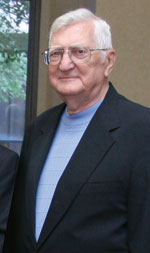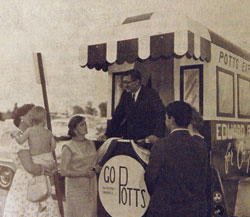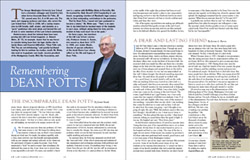Remembering Dean Potts
The George Washington University Law School lost a cherished colleague and friend this fall, when former Associate Dean Ed Potts, JD '52, passed away Oct. 8 at 86 years old. The warm and engaging professor and dean, who served the Law School from 1952 to 1988, left a lasting impression on GW faculty, staff, alumni, and students as a "go-to" gentleman who went above and beyond the call of duty to serve members of the Law School community.
Reminiscences about the beloved dean have been pouring into GW Law School magazine. A. Howard Metro, JD '72, for example, shared that he was forced to consider taking leave from his legal studies due to family illness and financial difficulties. "Dean Potts said, "No! You are not withdrawing," and quickly facilitated funding for him to continue his studies, recalls Mr. Metro, who went on to graduate cum laude, become president of the Montgomery County (Md.) Bar Association, and now is a partner with McMillan Metro in Rockville, Md. He received the Daily Record's 2010 Leadership in Law Award, recognizing members of Maryland's legal community for their outstanding contributions to the profession.
"But for Dean Potts, I would not have graduated or become a lawyer," Mr. Metro says. "There is no question in my mind that he touched many of the students in each class, willingly giving them his time and his wisdom to help each reach his or her goals."
On these pages, two members of the GW Law School community, Professor Jerome A. Barron, who served as dean from 1979 to 1988, and Jennie Meade, director of special collections at the Jacob Burns Law Library, reflect on the life and legacy of Dean Potts.
The Incomparable Dean Potts
 Jennie Meade, director of special collections at GW's Jacob Burns Law Library, spoke with Dean Potts early in October 2010, a few days before his unexpected death. "The Law School was clearly one of Dean Potts's favorite subjects," says Ms. Meade, who contacted the dean to invite him to participate in the law library's oral history project. "An hour or so later, when we came up for air, still laughing, we marveled at his unique career in the law."
Jennie Meade, director of special collections at GW's Jacob Burns Law Library, spoke with Dean Potts early in October 2010, a few days before his unexpected death. "The Law School was clearly one of Dean Potts's favorite subjects," says Ms. Meade, who contacted the dean to invite him to participate in the law library's oral history project. "An hour or so later, when we came up for air, still laughing, we marveled at his unique career in the law."
After 36 years as associate dean and professor, Ed Potts had many stories to tell. We began by talking about his domestic relations class, in which I was a student during my third year. He taught the subject superbly, with a clear, direct delivery, and was friendly and approachable, with an easy manner and natural authority in the classroom. He used plenty of humor to make his points. Dean Potts mentioned a "trick" he used to ensure class attendance: He fashioned the exam so that if one chose not to attend class, it was impossible to do well. Of course, one needed to know this early in the semester! For the attendance-shirkers, it was mostly too little, too late. He spoke of meeting an alumnus at a Law School function who confided that he received his worst grade in law school in domestic relations. To which Dean Potts responded, "You would have done better if you had bothered to come to class!"
Dean Potts talked about his entry into the academic world, a move he had not considered until Jim Webb, the second administrator of NASA, became instrumental in convincing him to consider the change. His career as a GW Law dean and professor, while not one he had envisioned, he said, was thoroughly satisfying and never dull.
As associate dean, Ed Potts was intimately involved with the "nuts and bolts" of law school operations and understood the organization and its dramatis personae, both professors and students, from stem to stern. If something went wrong, it was Dean Potts who got the call. He "got the call" in situations as diverse as the discovery of a nude professor in the law library in the middle of the night (the professor had been evicted from his apartment and needed a place to stay temporarily), and figuring out how to find the bluebooks lost for an entire class (Dean Potts' instincts told him to check a seldom-used locker, and there they were).
One of his regular responsibilities was making sure all faculty members submitted their grades on time at the end of each semester, not always an easy task, and not one that endeared him to the habitual offenders who ignored the deadline. In fact, it seems many of the duties attended to by Dean Potts over the years put him squarely on the firing line, where he operated with aplomb. He laughingly remarked that the correct answer to the question "What does an associate dean do?" is "He says NO!"
It probably was not how often he said "no" which distinguished him, but rather his integrity and willingness to take the necessary stand, whether popular or not, to ensure a principled result. Dean Potts would have brushed aside this label, but he was "incomparable."
A Dear and Lasting Friend
I met Ed Potts when I came to this law school as a teaching fellow in 1959. Ed was assistant dean. Through my good fortune, Ed and I became friends. He was a good friend to have. His administrative responsibilities were varied—placement, the physical plant, student problems, alumni relations, the secretarial staff—all were in his bailiwick. In those days, the deans' offices were on the first floor of Stockton Hall. His secretary's desk was outside his office and there was a wooden plaque on her desk with her name on it. In later years, Ed took each one of those plaques and mounted them on the wall in his office. Every secretary he ever had was memorialized on that wall. I always thought that showed something important about him. He cared about the people he worked with.
As a good friend, he wasn't afraid to tell you the truth. After my teaching fellow year, I served as a law clerk to a judge and joined a law firm as an associate, then entered law practice. (I should mention he was instrumental in helping me with each of these jobs.) While I was a law clerk, I taught a first-year course in the evening at the Law School. The course, Legal Method and Legal System, was a four-credit course that was required of all first-year students. I was 27 at the time and only slightly older than some of the students I was teaching. I remember that one day while I was teaching that course he asked me to come and see him. I did and he asked how the course was going. I said I thought it was going all right. He said, "Well, the students seem to like you, but I thought I should talk to you. I want you to listen to something." He then played the tape recorder. I then heard someone talking at a speed faster than the speed of light. It was me. He laughed and said, "Slow down, Jerry."
In Bob Kramer's administration, Ed served as associate dean. During that time, part of his responsibilities was to act as dean of students. Ed was there if a law student landed in jail or in the hospital and had no one to help. The time of the day or night did not matter. If bail money was needed, he provided it. All these tasks were performed with warmth, good humor, and a very keen sense of how Washington worked.

This October 1964 edition of Amicus Curiae Law School student newspaper shows Ed Potts' efforts during an unsuccessful run for Congressional office. He is standing on what became known as the "Pottsmobile."
In the 1970's, one of the major anti-Vietnam War protests occurred. Some of our faculty joined many of our law students in the ensuing demonstration. It turned out that a couple of our faculty members who had joined the student protests were arrested with them. However, we didn't know where they were. Ed found them. Ed called a judge who was an alumnus who told him they were being held with hundreds of others at Kennedy Stadium. They were found and released. For Ed, it was all part of a day's work.
When I became dean in 1979, I thought it was serendipity that the sitting associate dean for administrative affairs was my friend, Ed Potts. Ed continued to serve as associate dean until his retirement in 1988. During those nine years he served with me, I had the benefit of his wise counsel, his great sense of humor, and his unfailing courtesy and generosity. He understood people. He knew how to deal with them. But many people have those abilities. What was unique about Ed was that he was truly interested in solving their problems. In the early days of my deanship, he gave me some unsolicited but precious advice. He said that it was just as important to listen to people as to solve their problems. He said that just listening was many times all people wanted or needed.
Ed served in some way in the administrations of the following deans of The George Washington University Law School: Jack Fey, Oswald Colclough, Louis Mayo, Robert Kramer, and me. For each of them, he was an invaluable part of the administration. For each dean, he became a dear and lasting friend. As one of his colleagues said about Ed Potts, "He had a way of making your problem his problem." His contributions to this Law School are in the thousands of students whose careers he jump-started and in the unselfish way he served the students, faculty, staff, and alumni of this Law School.
Do you have a favorite memory of Dean Potts? Please share it with us by sending an e-mail to magazine@gwu.edu.

